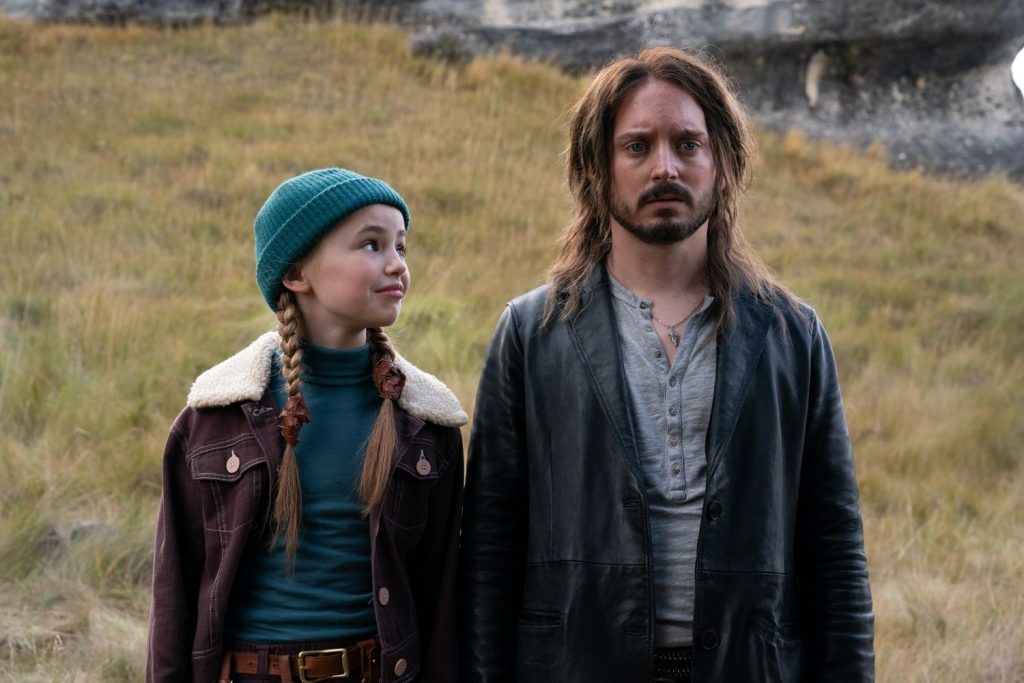Reviews include 40 Acres, Jurassic World: Rebirth, and Sorry, Baby.
Everything’s Fantastic at Montreal’s Fantasia Festival
July 28, 2024

By Jason Gorber
Every summer, a delightful darkness descends on Montreal as genre film fans, filmmakers, and other industry professionals arrive at the campus of Concordia University to experience one of the most exceptional festivals in the world. Since 1996, the Fantasia International Film Festival has showcased past and future cult classics from around the world, from a wide range of Asian cinema to everything from Estonian chainsaw musicals to epic French action-adventure period pieces to horror films of all stripes.
The festival has a jury component, a major market under the Frontiers moniker that has significant ties to European festivals, and a swarm of regulars that bring a unique boisterousness to each screening that’s both infectious and impressive. There are certain common traits, from the “meowing” that adjoins the anti-piracy messages to the rock-and-roll sense of anticipation before most screenings, but generally it can be said that just about any film, regardless of inherent qualities, will be given its utmost attention and appreciation by a group almost willing each experience to be truly wonderful.
Of course, this sometimes masks what otherwise may be flawed films. I’ve had many conversations with filmmakers warning them about this “loving everything equally” mode that sometimes befalls the fest. That’s not to take anything away from the experience, but many a film has had producers leave the place convinced they’ve got a masterpiece on their end, for why else would there have been continuous effusive reaction for every blood spurt or moment of shock. This isn’t unique to Fantasia – look at the odd metric of counting the minutes of standing ovations at Cannes, truly a misleading measure for the reception of any film given the pomp and circumstance surrounding the tuxedoed event – but as long as one doesn’t completely succumb to the enthusiasm, the warm reception that this crowd bestows provides an exceptionally rewarding feeling.
And it’s not as if there aren’t films that warrant such unabashed enthusiasm, and, to the credit of all, these are highly educated filmgoers that are open to a wide variety of films, be they experimental or straightforward, grisly or sweet, cacophonous or quietly assured.
Take this year’s opener, Bookworm, a PG-13 rated action adventure film from New Zealand’s Ant Timpson. The director is exactly the kind of regular that this fest has fostered, dating back to his days as a film print collector and genre obsessive, through to his role as producer on such local classics as Turbo Kid, through to his recent directorial work collaborating with Elijah Wood. This was Wood’s first time in Montreal for the fest, having been a regular at the similarly scoped Fantastic Fest in Austin, Texas.
Bookworm inverts the parent/child dynamic of Timpton’s previous collaboration with Wood, Come to Daddy by putting the actor in the father role. He plays a gormless illusionist whose magic tricks fail to impress an estranged daughter Mildred (Nell Fisher) with whom he must connect after a toaster accident sent her mother to hospital. The two go off into the wilderness to hunt for a panther in order to win a photo contest, and along the way find the need to connect more deeply as things go awry.
Fisher, who previously appeared in Evil Dead Rise and is soon to star in the next season of Stranger Things, is exceptional here, and the young actress appears on the verge of a major career. Teamed with Wood, whose acting chops are often overlooked by those rightfully obsessed with his connection to legendary genre films like the Oscar winning Lord of the Rings films, takes this quirky dullard character and turns it into something truly three dimensional. It’s a delightful, warm film with enough range to keep it engaging, and while surprising on the outside for those expecting some rated-R bloodfest to start Fantasia’s slate, readers would be warmed to know that the audience seemed to genuinely be aboard the ride.
The opening weekend had another film that generated plenty of attention before its screening. For many genre fans, Chris Stuckmann is the voice of a generation, as his YouTube audience of over two million followers is indicative of a reach that humbles just about any established critic. A decade-long project to bring his idea to life, Shelby Oaks was birthed by a massive Kickstarter haul and the attention of genre producers such as Mike Flannigan. Standing ovations before the film’s premiere indicated just how much the local crowd was anticipating this found footage film as it unfolded for the world premiere.
Unfortunately, the film itself falters, squandering a genuinely compelling early act to descend into typical, dreary horror tropes complete with faulty flashlights, creaky floorboards, and interminably slow turning of doorknobs. It was announced that the powerhouse indie studio Neon picked up the film prior to its debut, and with a massive marketing push the film should well see some success during its release in 2025. For general audiences that seem hungry for this kind of film, it may well produce a fine return. For me, however, it’s indicative of what befalls many fans-turned filmmakers, simply namechecking a series of references to earlier, superior works rather than carving out a niche of its own.
Meanwhile, I finally caught up with Alexandre de la Patellière and Matthieu Delaporte’s The Count of Monte Cristo, having missed at Cannes this sprawling telling of Alexandre Dumas’s legendary tale. Somewhat embarrassingly, this was my introduction to the tale of Edmond Dantès, and it was wild to see the fingerprints of this Batman-like origin story play out on so many other beloved stories. This telling has the thrills of a Mission Impossible film with myriad masks and levels of hijinks tied to any of your favourite revenge thrillers. Sumptuously told, its scoped is well-earned, and it practically flies by. It’s all thrusting chests, swaggering sword play, and mischievous mayhem. I couldn’t have been more pleased with the result.
Meanwhile, Nouhiro Yamashita’s Confession is a two-hander set in a mountain cabin where a climbing accident results in two friends seeking shelter, only to quickly turn on one another with brutally violent results. There’s an almost cartoonish level of violence at play here, taking the Misery-like claustrophobic mayhem to the nth degree. While not particularly groundbreaking, this is exactly the kind of film elevated by an audience like the one at Fantasia. Every thump to the end or crashing down from height was experienced with the added frisson of the fans’ reactions.
There was much hype surrounding Joel Potrykus’ Vulcanizadora, another film about two friends that goes off the rails. Presented with the short film Erection and Destruction by Eddie Mullins, both films star Joshua Burge, best known for The Revenant, but a stalwart in independent genre cinema. The former presents a suicide pact storyline with appropriate sardonicism, but the languid pace and disjointed execution mean that the journey lacks its intended impact.
On the other hand, I almost never abandon a film, but I couldn’t get past more than a few minutes of Nile Atallah’s Animalia Paradoxica before escaping to hang out with friends and colleagues at the local pub that serves as a kind of social hub for cinephiles gathered at the festival. Instead, I gave Michael Duignan’s The Paragon my attention and thoroughly enjoyed this blackly comic look at the occult, the paradoxes of time travel, and more. Its low-fi aesthetic is perfectly employed here, and with broad performances and a smart script, it’s exactly the kind of confident quirkiness I seek out at this festival. The fact that it was joined by an absolutely delightfully bonkers short, Eros V’s must-see Muppet-y Meat Puppet, made the day that much better.
I was promised a wild Western from Korean director Hwang Wook’s Mash Ville, but instead was treated to a needlessly convoluted storyline that, despite some stylish flourishes, never lived up to the promise of its premise. Vivieno Caldinelli’s Scared Shitless, on the other hand, revelled in its scatological silliness. The Walking Dead’s Steven Ogg and Day of the Dead’s Daniel Doheny and Chelsea Clark (The Protector), along with the likes of legendary Kids in the Hall’s Mark McKinney, provide engaging performances. Steve Kostanski-designed monsters make short shrift of plumbing fixtures and delicate fleshy bits alike, and this unapologetically Torontonian of toilet terrors played brilliantly during a week in which reports of storm-caused sewage mayhem in the city were rife.
I’m a sucker for Asian gangster dramas, too, and while Hiroshi Shoji’s yakuza tale Tatsumi doesn’t live up to the best of them, it was still a decent experience, warmed by good performances and moments of welcome intensity. Julien Maury and Alexandre Bustillo, still justifiably celebrated for their Midnight Madness classic Inside, crafted a stylish if slightly aimless “policier” with The Soul Eater. The film follows two mercurial investigators who reluctantly join forces to uncover a scandalous truth. Despite the obvious plot holes, I still found myself drawn in to this tale, far more entranced by the machinations of making sense of the happening then the predictable answers found in the banal conclusion.
To swing to another tonality entirely, Estonian filmmaker Sander Maran’s Chainsaws Were Singing is an unapologetically bonkers mashup of mid-’80s mega musicals and logging equipment-bestowed slasher films of the ’60s and ’70s. Looking like it was shot on a handicam that was dropped in a river, yet with the addition of “cigarette burns” in the corners to indicate reel changed from film prints, the film revels in its low-fi aesthetic and over-the-top madness. The tunes are twee yet well performed, the storyline simple yet effective, and the general sense of mayhem and ridiculousness, from ejaculating magical fridges to feats of human flesh, combine to that rare thing at genre fests like this: It’s not like anything you’ve seen before.
Finally, a shout out to Toronto filmmaker Vasili Manikas, who along with his producer/brother Dimitri have crafted a stylish, spooky, surreal bite of body horror with their short Ring Neck. I’m always enthused when new generations in this city take up the mantle that David Cronenberg has provided, and this burst of lovelorn surrealism, which turns a taciturn character unable to express his desires and his trauma into a spectre of terror, provides a welcome sign from a new generation of genre fans crafting their own worlds while paying homage to what’s come before. I look forward to seeing what Manikas will do in the future, just as I anticipate returning next year to this beloved festival, taking part in runs for hot bagels from St-Viateur, exploring the finest of cuisine the city has to offer, and reconnecting with the community of fellow weirdos that gathers each year to share these wild and wonderful films.



